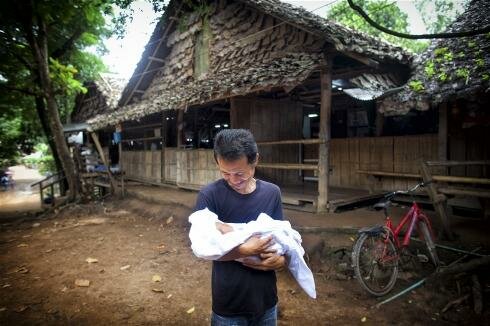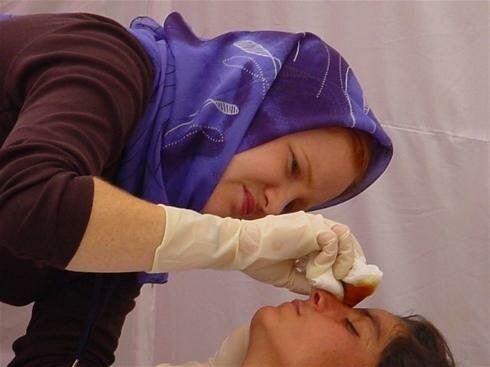At Risk Because They Don't Exist
Two-thirds of children in South Asia are not registered at birth, leaving them vulnerable to exploitation.
 Stronger civil registration systems are needed in Asia, home to 60 percent of the world’s population, to ensure the legal and human rights of all, and facilitate health planning, experts say.
Stronger civil registration systems are needed in Asia, home to 60 percent of the world’s population, to ensure the legal and human rights of all, and facilitate health planning, experts say.
“Civil registration is the most basic requirement for individuals to establish legal identity and to formalize family relationships, and is thus a basic responsibility of the state,” Haishan Fu, director of the statistics division at the Economic and Social Commission for Asia and the Pacific (ESCAP) in Bangkok, told IRIN. “Without a legal identity, individuals may be deprived of the right of access to key public services such as health, education, social welfare and recourse to justice.”
According to the World Health Organization, only one quarter of the world’s seven billion inhabitants live in countries with registration systems that record births and death efficiently; 85 countries have only lower quality data ;74 lack any data on causes of death.
In the world’s two most populous countries (China and India - home to more than 2.5 billion people) there is no functional civil registration system, while mortality statistics are provided by using sample registration approaches, 2012 world health statistics reveal.
The UN Children's Fund (UNICEF) notes that 51 million children go unregistered each year globally, while in South Asia two out of three children are not registered at birth and thus have no official record of their names, family and place or date of birth.
About 60 percent of Indonesian children under-five years of age do not have birth certificates, and half are not registered anywhere, UNICEF reports, while in neighbouring Timor-Leste an estimated 70 percent of children under five do not have a birth certificate - one of the lowest birth registration levels of any country in the region.
The absence of such documentation leaves children vulnerable, experts warn.
“Children also need recognition of their existence before the law, which can help protect them against illicit changes to their identity - such as their name and who their parents are,” said Amalee McCoy, regional child protection specialist for UNICEF. “No child deserves to be unregistered, and no nation can afford not to have reliable systems for registering them."
Birth certificates are critical forms of social protection for vulnerable and marginalized groups such as people in poverty, and can be an effective tool for preventing human trafficking and child marriages, ESCAP’s Fu said.
“Civil registration is at the heart of inclusive development because it provides the legal identity that enables voice, choice and protection,” she notes.
According to a 2011 report published by the WHO Health Metrics Network (HMN), a Geneva-based network that assesses health information systems worldwide, basic foundations of a good health information system and health information workforce - including vital registration systems - remain inadequate in many countries.
A registration system is essential in a country because it creates the legal tools to establish and protect the civil rights of individuals, and creates a critical data source for the compilation of vital statistics, the report concludes.
 However, without civil registration data, people who remain unregistered in a region, especially vulnerable populations such as women and children, are legally invisible to policymakers and thus exposed to exploitation, abuse and human trafficking.
However, without civil registration data, people who remain unregistered in a region, especially vulnerable populations such as women and children, are legally invisible to policymakers and thus exposed to exploitation, abuse and human trafficking.
Health planning
Data on fertility and causes of mortality derived from a functional registration system are essential in building national and global policies for health development.
“If children are not registered when they are born, they do not exist in the government plans. They are not eligible for immunization or for going to school. Adults do not receive appropriate health care; they do not have access to services nor legal rights. People are suffering, they are not protected and remain invisible,” said Alan Lopez, professor of global health and head of the School of Population Health at the University of Queensland.
Unregistered children and adults from ethnic minority groups such as Myanmar’s Rohingya, who are de jure stateless under Burmese law, by default have limited access to food and health care, leaving them susceptible to preventable diseases and malnutrition. Many are prevented from attending school and used for forced labour.
At the same time, the lack of death registrations - in particular for cause-specific mortality such as maternal, HIV/AIDS or malaria mortality in middle and low income countries - complicates health workers’ ability to estimate the disease burden, which is necessary for effective prevention and treatment.
“All countries have some form of a civil registration system but at different levels of quality and coverage,” ESCAP’s Fu said, adding that the best way to improve civil registration, and the most sustainable, is building on the systems already in place and identifying how civil registration can complement the other activities of governance.
“The value of regional collaboration and regional knowledge-sharing cannot be underestimated with respect to supporting the improvement of civil registration. Countries can learn from each other’s systems, particularly how they have overcome similar challenges,” she said.
The barriers for individuals registering births, deaths, marriages, adoptions, etc., are quite significant and those can include geography, cultural differences, inadequate legal frameworks and the cost of registration to the individual.
For UNICEF’s McCoy, costs attached to birth registrations, bureaucracy, and discriminatory laws against specific populations such as refugees, migrants, ethnic minorities and the stateless, are the main reasons why civil registration systems tend to fail vulnerable people.

















